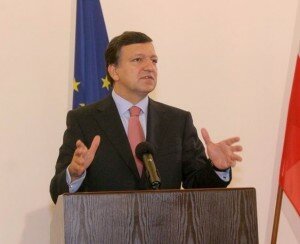Absent political reaction to the State of the Union
More integration and a commitment to a stronger and ever closer European Union. José Manuel Barroso, president of the European Commission, plotted out the way forward for Europe in his speech on the State of the Union. At least for now, most of the opposition remains silent.
by Axel Kronholm & Rasmus Bagge Jensen
WHEN Nigel Farage, co-leader of the eurosceptic Europe of Freedom and Democracy, stepped up to give his response to President Barroso’s State of the Union adress, the other members of parliament didn’t know whether to smile or look the other way. Probably none of the MEPs had missed Mr. Farage’s scolding of the then new President of the European Council, Herman von Rompuy, back in february 2010, and knew what kind of rhetoric was about to be unleashed.
“Far from it being a ‘State of the Union’ I would argue that the Union is in a state. Because, just look at the confusion… We’ve got presidents all round this room, goodness me, even I am a president! I’m not sure what the collective noun for presidents is, perhaps it’s ‘incompetence’, I don’t know. But certainly when you take away democratic accountability, it’s clear nobody is in charge,” Nigel Farage said.
General expressions of support
Apart from Nigel Farage’s colorful response, President Barroso’s speech – although filled with controversial statements – attracted little political attention, apart from general expressions of support from most of the European Parliaments’ party leaders.
This was in stark contrast to the contents of President Barroso’s speech, in he touched on the very core of European power-politics; the infighting between the national governments and the supranational EU institutions over sovereignty. He called for more integration to help the union to overcome the current economic crisis. On the same day as he held his speech, the European Parliament voted for a reform of the Stability and Growth Pact, which greatly widens the EU’s surveillance and enforcement capabilities, when it comes to auditing the budgets of the nation states. A big step in the direction of much deeper European integration.
“We can now discuss Member States’ budgetary plans before national decisions are taken. This mix of discipline and integration holds the key to the future of the euro area. Only with more integration and discipline we can have a really credible euro area.”, President Barroso said in his speech.
Backing of the Parliament
Martin Schulz, head of the EP’s Socialists and Democrats, supported President Barroso’s statements. “He showed that he is prepared to fill the vacuum which is existing.” Schulz said, and added that Barroso “needs the backing of the Parliament and we are prepared.”
Most responses showed a general support for President Barroso and his statements. Guy Verhofstadt, leader of the liberal ALDE group, welcomed the President’s passionate defence of the European Union, stating that “only courage, solidarity and leadership will provide a route out of the current crisis.”
This exchange of platitudes and show of support, prompted coloumnist of the Belgian daily Le Soir, Maroun Labaki, to suggest, that a new alliance was forged between parliament and the European comission.
“The President of the European Commission gave a grand and eminently political speech on ‘the state of the Union’. [...] One can predict that an ‘axis’ was born yesterday between the Commission and the Europarliament. This rapprochement will be made de facto at the expense of the capitals and of the Council as a whole. The heads of state and government have true cause for worry”, Maroun Labaki writes.
National leaders remain silent
But if there indeed is cause for alarm for the national leaders, they are so far not showing any distress despite President Barroso efforts to contribute Europe’s problems to disloyal member states. “Is it Europe that does not deliver, or is it some governments that don’t deliver?” the Commission president asked in his closing statements after the debate in Parliament.
This wasn’t the President’s only subtle attack on the member states, but his critique has so far not prompted any significant rebuttal from national leaders. The only outcry from the member states came from across the channel, when the Brittish Treasury spoke out against President Barroso’s support of instating a financial transaction tax
A spokesman for the Treasury, interviewed by The Independent, said “any financial transaction tax would have to apply globally”. This is in line with previous statements by the Brittish Chancellor of the Exchequer, George Osborne, who argues that a financial transaction tax would bring more harm than relief to Europe.
“I am against an EU tax. There would be no point introducing a financial transaction tax that led, the next day, to our foreign exchange markets moving to New York or Singapore or anywhere else.” Osborne said at the recent G7 summit.
The real fight has yet to come
President Barroso said he was ready to accept the criticism put forward in the debate, but stated that “the Commission is proud of the work it has achieved. Everything I said last year in the European State of the Union, I checked – we have delivered.”
Remaining is the question what the Commission will be able to deliver this time. The absence of a loud opposition following the State of the Union does not mean the actions proposed in the speech can be implemented smoothly. The opponents of deeper integration might just be saving their ammunition to the next summit.
